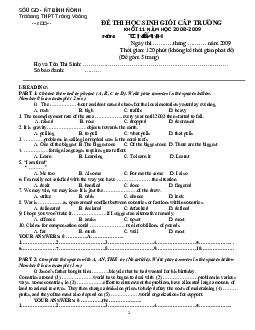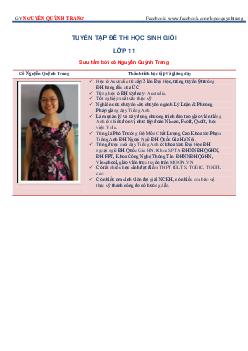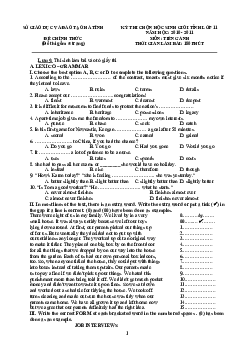








Preview text:
I. LISTENING (3.0 pts)
PART 1: Questions 1-10 (2.0 pts).
For question 1-4, you will hear a woman asking a shop assistant about DVD players and
complete the form below. Use NO MORE THAN THREE WORDS AND/OR NUMBERS for
each answer. You will hear the conversation twice.
Write your answers on the Answer Sheet. DVD Customer Profile
Occupation: Example: 0. students .
Have you owned a DVD player before? 00. No .
What is the maximum you want to spend on a DVD player? 1. __________
How often do you watch DVDs? 2. ___________
What type of films do you enjoy? 3. ___________
What other DVDs (non-film) do you watch? 4. __________
For questions 5-10: Now listen to the next part of the conversation and complete the table
below. Use NO MORE THAN TWO WORDS AND/OR NUMBERS for each answer. You
will hear the conversation twice.
Write your answers on the Answer Sheet. Player Features Cost After-sales service DB 30 Basic £69 5. ______ only
XL 643 Can also 6. ______ 7. ________
8. ______ at reduced cost
TriX 24 Will also play .9. ______ £94 including 10. _______ Guaranteed for 3 years
PART 2: Questions 11-15, you will hear someone talking about a trip to India and choose
the best answer A, B, C or D to complete the following sentences. You will hear the
conversation twice. (1.0 pt.) Write your answers on the Answer Sheet.
11. Why did Steve go to India?
A. To film the Diwali celebrations. B. For a holiday during the Diwali celebrations.
C. To see the Diwali celebrations.
D. To see the Music festival.
12. What happened to Jonathan? A. He got food poisoning. B. He had a high fever. C. He was run over by a bus. D. He felt quite well. Page 1 of 9 pages
13. Why couldn't Steve get a local doctor? A. They couldn't find one. B. There were no buses.
C. The hospital was too far away.
D. Jonathan didn't want to see a doctor.
14. How long did the trip to Delhi take? A. 80 hours B. 8 hours C. 18 hours D. 88 hours
15. What was the cause of Jonathan's illness? A. Typhoid B. Malaria C. A heart attack D. Flu
II. LEXICO- GRAMMAR (6.0 pts)
PART 1: For questions 16- 35, choose the option (A, B, C or D) that best completes each of
the following sentences. Write your answers in the Answer Sheet. (2.0 pts)
Write your answers on the Answer Sheet.
16. She doesn’t want to be laughed _________by others. A. in B. on C. with D. at
17. The scientists _________invention was a success became famous. A. who B. whose C. which D. that
18. I wish there_________ any natural disasters in our world. A. are B. were C. aren’t D. weren’t
19. The bench would collapse if they_________on it. A. stood B. stand C. standing D. stands
20. The students are looking forward to _________the result of the final examination. A. receives B. receive C. receiving D. received
21. It’s hot here. Open the window, _________? A. shall you B. will you C. shall we D. don’t you
22. They are used _________outdoors and under pressure. A. to work B. to be working C. to working D. worked
23. We are all aware ________ the importance of the environment protection. A. of B. for C. from D. with
24. I suggest that all of you __________ hard for the coming exam. A. working B. to work C. can work D. should work
25. It took us almost four hours to ______ to London. A. reach B. arrive C. get D. approach
26. Some medicines are only available on ______ A. description B. instruction C. destruction D. prescription
27. She had to pay the adult ______ on the bus because she was 18. A. fare B. reward C. salary D. fine
28. We decided ______ because of the bad weather. A. not to go out B. not going out C. not go out D. not gone
29. John helped the old lady to ______ the bus. Page 2 of 9 pages A. take on B. get on C. put off D. bring about
30. That coat is far too ______; I'll never be able to afford it. A. valuable B. reasonable C. expensive D. precious
31. She spent a great ______ of her time in London. A. period B. number C. quantity D. deal
32. It's difficult to______ the difference between margarine and butter. A. speak B. tell C. say D. look
33. If you do not repay the money we will, as a last________, take you to the court A. measure B. attempt C. act D. resort
34. This painting stands a good _________ of winning a prize A. chance B. opportunity C. possibility D. certainty
35. I only take the job on my own __________ A. means B. demands C. terms D. requirements
PART 2: For questions 36-45, look carefully at each line. Some of the lines are correct, and
some have a word which should not be there. If a line is correct, put a tick (√ ). If a line has a
word which should not be there, write the word on the Answer Sheet. There is an example at
the beginning (0). (1.0 pt) A holiday in Scotland
0. …….√……......
Some friends of mine decided to go on holiday to Scotland. They
asked me if I was wanted to go too, but I had already arranged to go to 36. ……………...
Italy. I told them that I had been to Scotland before, they asked me to
37. ……………...
give them some ideas. I advised them to take up warm clothes and
38. ……………...
raincoats. 'If I were like you, I'd always carry umbrellas!’ I told them. 39. ……………...
'I doubt that whether you'll have any sunny days.' I didn't see them
40. ……………...
again until was after their holiday. They were all very sun-tanned,
41. ……………...
and they told to me that they had had very hot weather. 'If we had
42. ……………...
taken your advice, we would have made a terrible mistake, ' they said. 43. ……………...
'Luckily we were told us before we left that it was very hot in 44. ……………...
Scotland. It is said to they have been the hottest summer ever! 45. ………..…….
PART 3. For questions 46-55, read the text below and think of the word which best fits each
space. Use only one word in each space. (1.0 pt).
Write your answers in the Answer Sheet. PREDICTING EARTHQUAKES Page 3 of 9 pages
It has long (0). been known that animals, birds and insects behave differently before an
earthquake. People (46) _______ seen fish jump out of water onto dry land, and mice appear
dazed before quakes, allowing themselves to be caught easily.
In December 1974, Chinese scientists began (47) _______ receive reports of snakes coming out
of hibernation and freezing to death on the cold ground. This was followed (48) _______ a
series of minor tremors at the end of the month. The following month they received even more
reports of strange animal behaviour in the city of Haicheng. Many (49) _______ these
concerned cattle and horses which had become restless and were (50) _______ frightened to
enter buildings. As a result, city leaders evacuated the entire city. Soon after, a major
earthquake struck; the city leaders had succeeded (51) _______ saving countless lives.
(52) _______ then China has suffered a number of major quakes, which they were not as
prepared (53) _______. Nevertheless, the Chinese have demonstrated that earthquakes do not
always strike without warning.
It is a fact that some animals are very sensitive to sound, temperature, touch, light and even
magnetic fields. Therefore, they may be able to detect the seismic activity (54) _______ comes
before an earthquake. It would (55) _______ a pity to ignore the signs.
PART 4. For questions 56-65, read the text below. Use the words given in CAPITAL at the
end of some of the lines to form a word that fits in the numbered gap below. Write your
answers on the Answer Sheet. There is an example at the beginning (0). (2.0 pts) Remembering for exams
It's (0) frustrating for everybody not to be able to 0. FRUSTRATE
remember things but having a bad memory can be a
particular (56)_____________ for students at exam time. 56. ADVANTAGE
Anyway, I did a search on the Internet and found 57. COUNT
(57)_____________ ideas for improving your memory but 58. HELP
one idea I thought particularly (58)____________ was that
we should try and use all our senses when given 59. INFORM
(59)____________ to learn. So, for example, instead of 60. SILENCE
reading (60)____________ , we should record the material
and then listen to it. Apparently, the (61)___________of 61. COMBINE speaking and listening helps reinforce the 62. WRITE
(62)___________ text. Another theory, which some people
might find (63)__________ , is that there is a greater 63. LIKE
(64)_____________ of our memorizing something 64. POSSIBLE
successfully if we do it when the house is 65. PEACE
(65)_____________ and preferably just before bedtime.
III. READING (6.0 pts)
PART 1: For questions from 66 - 75, read the text below and decide which option (A, B, C, or D)
best fits each of the numbered gaps. Write your answers in the Answer Sheet. (2.0 pts) Page 4 of 9 pages TRAFFIC IN OUR CITIES
The volume of traffic in many cities in the world today continues to expand. This causes many
problems, including serious air pollution, lengthy delays, and the greater risk (0) of
accidents. Clearly, something must be done, but it is often difficult to (66) _______ people to
change their habits and leave their cars at home.
One possible approach is to make it more expensive for people to use their cars by increasing
charges for parking and bringing in tougher fines for anyone who (67)_______ the law. In
addition, drivers could be required to pay for using particular routes at different times of the
day. This system, (68) _______ as 'road pricing', is already being introduced in a (69) _______
of cities, using a special electronic card fixed to the windscreen of the car.
Another way of (70) _______ with the problem is to provide cheap parking on the (71)_______
of the city, and strictly control the number of vehicles allowed into the centre. Drivers and their
passengers then use a special bus service for the (72) _______ stage of their journey.
Of course, the most important (73)_______ is to provide good public transport. However, to
get people to (74)_______ the comfort of their cars, public transport must be felt to be reliable,
convenient and comfortable, with fares (75)_______ at an acceptable level. 0. A. of B. for C. about D. by 66. A. make B. arrange C. suggest D. persuade 67. A. crosses B. refuses C. breaks D. cracks 68. A. named B. seen C. called D. known 69. A. quantity B. number C. total D. sum 70. A. doing B. handling C. dealing D. solving
71. A. outskirts B. border C. outside D. limit 72. A. late B. end C. complete D. final 73. A. thought B. thing C. work D. event 74. A. pass on B. throw away C. give up D. leave out 75. A. taken B. kept C. given D. stood
PART 2. (2.0 pts)
For questions 76 - 80, read the following passage and decide which option A, B, C, or D best fits
each of the questions. Out of Rainforests
Have you ever entered a tropical rainforest? It's a special, dark place completely different from
anywhere else. A rainforest is a place where the trees grow very tall. Millions of kinds of
animals, insects, and plants live in the rainforest. It is hot and humid in a rainforest. It rains a lot
in the rainforest, but sometimes you don't know it's raining. The trees grow so closely together
that rain doesn't always reach the ground. Page 5 of 9 pages
Rainforests make up only a small part of the Earth's surface, about six percent. They are found
in tropical parts of the world. The largest rainforest in the world is the Amazon in South
America. The Amazon covers 1.2 billion acres, or almost five million square kilometers. The
second largest rainforest is in Western Africa. There are also rainforests in Central America,
Southeast Asia, Northeastern Australia, and the Pacific Islands.
Rainforests provide us with many things. In fact, the Amazon Rainforest is called the "lungs of
our planet" because it produces twenty percent of the world's oxygen. One fifth of the world's
fresh water is also found in the Amazon Rainforest. Furthermore, one half of the world's
species of animals, plants, and insects live in the Earth's rainforests. Eighty percent of the food
we eat first grew in the rainforest. For example, pineapples, bananas, tomatoes, corn, potatoes,
chocolate, coffee, and sugar all came from rainforests. Twenty-five percent of the drugs we
take when we are sick are made of plants that grow only in rainforests. Some of these drugs are
even used to fight and cure cancer. With all the good things we get from rainforests, it's
surprising to find that we are destroying our rainforests. In fact, 1.5 acres, or 6,000 square
meters, of rainforest disappear every second. The forests are being cut down to make fields for
cows, to harvest the plants, and to clear land for farms. Along with losing countless valuable
species, the destruction of rainforests creates many problems worldwide. Destruction of
rainforests results in more pollution, less rain, and less oxygen for the world.
76. What is the focus of this reading? A. Kinds of forests
C. Facts about rainforests
B. Where rainforests are located
D. How much oxygen rainforests make
77. What do rainforests provide?
A. Drugs used to fight and cure cancer B. Oxygen C. Fresh water D. All of the above
78. Why is the Amazon Rainforest called the "lungs of the planet"?
A. It helps us breathe.
B. It uses much of the world's oxygen.
C. It helps circulation.
D. It provides much of our air.
79. Where would you NOT find a rainforest? A. Hawaii B. Canada C. Australia D. Brazil
80. What is the most likely reason why the author is surprised that we are destroying rainforests?
A. They are necessary for the health of our planet.
B. They are necessary for the fight against cancer
C. It will be too expensive to replant them.
D. It will be too difficult to grow food without them.
For questions 81 - 85, read the summary of the passage below. Fill in the blanks with the
correct word(s) that best fits each of the numbered blanks. There are more than you need. A. pollution B. make up C. run off D. disappearing E. oxygen F. drugs G. cut down H. creates Page 6 of 9 pages
Rainforests only (81) __________ six percent of the Earth's surface, but they are very
important to us. They provide us with much of the Earth's (82) __________ and fresh water.
Also, many of the (83) __________ we use to fight disease are made from rainforest plants.
Most of the creatures on the Earth, and foods that we eat, come from the rainforest as well.
Unfortunately, rainforests are (84) __________. They are being (85) __________ so that
farmers can grow crops or raise cattle. Problems resulting from the destruction of rainforests
include more pollution, less oxygen, and fewer species of animals.
PART 3: For questions 86 - 95, Read the following passage and mark the letter A, B, C or D on
your answer sheet to indicate the correct answer to each of the following questions from 51
to 60. Write your answers in the Answer Sheet. (2.0 pts) 1
All mammals feed their young. Beluga whale mothers, for example, nurse their calves for
some twenty months, until they are about to give birth again and their young are able to
find their own food. The behavior of feeding of the young is built into the reproductive
system. It is a non-elective part of parental care and the defining features of a mammal, 5
the most important thing that mammals - whether marsupials, platypuses, spiny anteaters,
or placental mammals - have in common.
But not all animal parents, even those that tend their offspring to the point of hatching or
birth, feed their young. Most egg-guarding fish do not, for the simple reason that their
young are so much smaller than the parents and eat food that is also much smaller than the
10 food eaten by adults. In reptiles, the crocodile mother protects her young after they have
hatched and takes them down to the water, where they will find food, but she does not
actually feed them. Few insects feed their young after hatching, but some make other
arrangement, provisioning their cells and nests with caterpillars and spiders that they have
paralyzed with their venom and stored in a state of suspended animation so that their
15 larvae might have a supply of fresh food when they hatch.
For animals other than mammals, then, feeding is not intrinsic to parental care. Animals
add it to their reproductive strategies to give them an edge in their lifelong quest for
descendants. The most vulnerable moment in any animal's life is when it first finds itself
completely on its own, when it must forage and fend for itself. Feeding postpones that
20 moment until a young animal has grown to such a size that it is better able to cope. Young
that are fed by their parents become nutritionally independent at a much greater fraction of
their full adult size. And in the meantime those young are shielded against the vagaries of
fluctuating of difficult-to-find supplies. Once a species does take the step of feeding its
young, the young become totally dependent on the extra effort. If both parents are
25 removed, the young generally do not survive. Page 7 of 9 pages
86. What does the passage mainly discuss?
A. The care that various animals give to their offspring.
B. The difficulties young animals face in obtaining food.
C. The methods that mammals use to nurse their young.
D. The importance among young mammals of becoming independent.
87. The author lists various animals in line 5 to________.
A. contrast the feeding habits of different types of mammals
B. describe the process by which mammals came to be defined
C. emphasize the point that every type of mammal feeds its own young
D. explain why a particular feature of mammals is non-elective
88. The word "tend" in line 7 is closest in meaning to ________. A. sit on B. move C. notice D. care for
89. What can be inferred from the passage about the practice of animal parents feeding their young?
A. It is unknown among fish.
B. It is unrelated to the size of the young.
C. It is dangerous for the parents.
D. It is most common among mammals.
90. The word "provisioning" in line 13 is closest in meaning to ________. A. supplying B. preparing C. building D. expanding
91. According to the passage, how do some insects make sure their young have food?
A. By storing food near their young.
B. By locating their nests or cells near spiders and caterpillars.
C. By searching for food some distance from their nest.
D. By gathering food from a nearby water source.
92. The word "edge" in line 17 is closest in meaning to _______. A. opportunity B. advantage C. purpose D. rest
93. The word "it" in line 20 refers to A. Feeding B. moment C. young animal D. size
94. According to the passage, animal young are most defenseless when ________.
A. their parents are away searching for food
B. their parents have many young to feed
C. they are only a few days old
D. they first become independent
95. The word "shielded" in line 22 is closest in meaning to ________. A. raised B. protected C. hatched D. valued IV. WRITING (5.0 pts)
PART 1: Questions 96-100, finish each of the following sentences in such a way that it
means exactly the same as the sentence printed before it. There is an example at the
beginning (0). Write your answers in the Answer Sheet. (1.5 pts) Page 8 of 9 pages
0. The pond isn't big enough to swim in
The pond is too small to swim in.
96. I think it is interesting to visit other countries.
I think visiting______________________________________________________.
97. I would prefer to walk rather than catch a bus.
I would rather ______________________________________________________.
98. I have difficulty in understanding his accent.
I find ______________________________________________________________.
99. It was a mistake for you to buy that house.
You shouldn’t _______________________________________________________.
100. The owner is always proud of his new car.
The owner always takes____________________________________________________.
PART 2: Questions 101-105. Finish each of the following sentences so that it has a similar
meaning to the sentences printed before it, using the word given. DON’T CHANGE THE
WORD GIVEN. You must use between THREE AND FIVE words, including the word given.
There is an example at the beginning (0). Write your answers in the Answer Sheet. (1.5 pts)
(0). ‘Do you know how to get to the town center?’, she asked me. (WAY)
She asked me if I knew the way to the town centre.
101. The holiday was too expensive; we couldn’t afford it. (SUCH)
It was ________________________________ we couldn’t afford it.
102. The club wouldn’t let Jack buy a drink because he wasn’t a member. (ALLOWED)
Jack _____________________________ a drink at the club because he wasn’t a member.
103. Provided you are not a vegetarian, I will cook for you. (LONG)
I will cook for you ______________________________ not a vegetarian.
104. Diane had a baby boy last night. (GAVE)
Diane ________________________________________ a baby boy last night.
105. Workers knew nothing about the plans to sell the company. (DARK)
Workers were ___________________________________ the plans to sell the company.
PART 3. Essay writing (2.0 pts).
More and more young people from wealthy parts of some countries are spending a short time
in communities in poorer villages doing unpaid work such as teaching or building houses.
Do you agree or disagree with these young people on their idea?
Write an essay of about 200 words to express your opinion.
___________THE END___________ Page 9 of 9 pages



